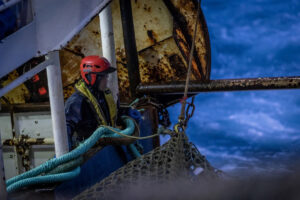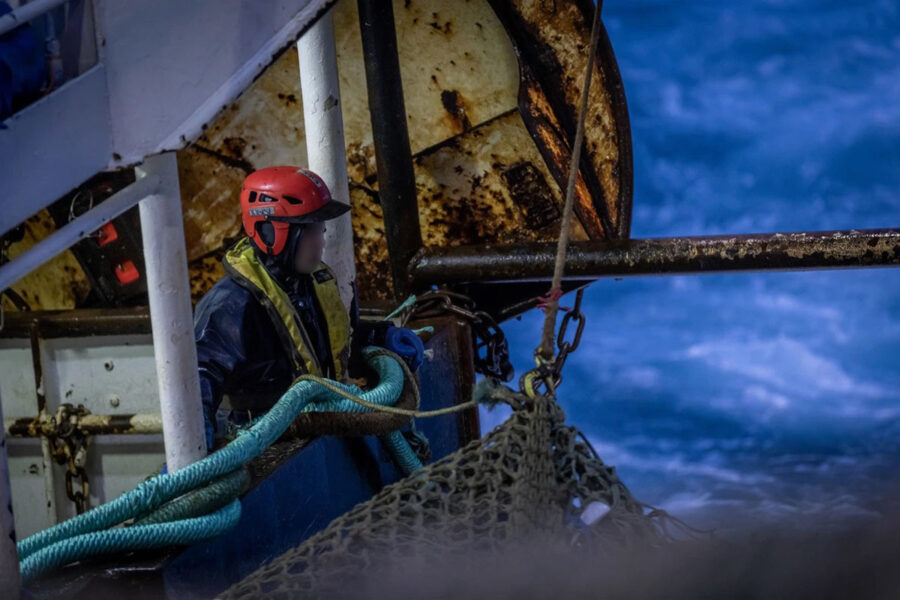Major news story on foreign crew on Kilkeel vessels ignores both the positives and the progress made during the course of the investigation
The Financial Times printed a major feature last Thursday, as FN was going to press, after a lengthy investigation into foreign crewing on UK fishing vessels, concentrating on a small number of Filipino fishermen based in Kilkeel.
The article includes allegations that crew worked shifts well in excess of those permitted, and that although they were largely well looked after and well treated, they were also required undertake work on gear ashore that ‘went beyond’ what should have been expected of them.
It also includes detailed AIS maps of several vessels over the period under investigation, suggesting that they were regularly fishing inside six miles, in breach of the transit visa rules in place at the time.
The feature follows the fate of four crewmen in particular, from before Covid until the present day, two of whom were injured at sea, one requiring an amputation, and a third, Mario Durens, who suffered a relapse of bowel cancer, after several years in remission, and who eventually died in a Northern Ireland hospice without being able to return home.
All three crew had worked for many years in the Northern Ireland prawn fishery, where they earned many times more than they could have done in comparable jobs in their home ports.
The article quotes the two injured crewmen, both of whom have now returned to the Philippines, as saying that in the main they were well treated before the accidents. However, they claim that they subsequently received poor support in the process of recovering and returning home.
One of the injured crew, Jose Quezon, whose hand was crushed in the winch of the Northern Osprey N 76, had one finger amputated, and two fingers requiring substantial wiring, and subsequently spent eight months ashore before returning home.

A still from the films shortly to be released by Waitrose in multiple languages, to help foreign crew understand more about working in the UK fishing industry. Multiple partners across the fish value chain, as well as independent welfare NGOs and certifying bodies, have been working together over the last three years to bring in open and verifiable crew welfare standards across the industry. (Photo: Eleanor Church/Lark Rise Pictures)
The Financial Times quotes statements from the Northern Irish owners of the vessels involved, denying mistreatment, and confirming that some movement restrictions had been requested of the crew, in order to ensure that they were meeting the full requirements of the transit visas. These allow travel away from the vessel or harbour for medical treatment, but not for social activities.
Mike Park of the Fishermen’s Welfare Alliance, the industry group that has been working hard to develop best practice when recruiting and working with foreign crew, including the development of an externally certified crew welfare assurance scheme, said of the report: “It obviously raises some negative elements – it would be wrong to say otherwise.
“Like other business sectors, we are focused on ensuring that the safety, wellbeing and fairness of everyone employed on fishing vessels is secured and maintained.
“We are working hard to ensure those very basic elements are in place and embedded with the help of a range of supporting organisations.
“It would be wrong to come to the conclusion that the negative elements suggested in the article are indicative across the industry as a whole, as that is just not the case. That said, we do need to continue the good work that is going on to ensure that such articles do not appear in the future.”
The SEA Alliance, a cross- industry group that works with a range of welfare organisations and companies to improve and support best practice for foreign crews working in the UK industry, is due to meet this week in Peterhead.
Included on its agenda is the release of a series of films designed to support foreign crew in the UK, which have been dubbed in 11 languages. FN will carry full details of the films in a future feature.
‘One-sided and selective’: NI industry reacts to criticism
Harry Wick, CEO of the Northern Ireland FPO and a member of the Fishermen’s Welfare Alliance, provides his personal reaction to the Financial Times article
It is upsetting and distressing for all of us when one of our fishing family suffers an injury at work, and absolutely heartbreaking when one of our own is diagnosed as terminally ill. The fact that employers and organisations named in the article didn’t have their side of the story published, or get to fully share with readers the actions they took to support their crew, shows that some in the media have no qualms about exploiting personal tragedy as long as it helps them get clicks on a website.
That this no longer comes as a surprise is not to deny there are any issues in our industry. When health and safety routines break down, we should of course scrutinise and shine a light on what went wrong. That is how we get better. Both health and safety and welfare are processes in which the industry should and does look for continuous improvement.
However, to attempt to blacken the reputation of our industry by selective reporting, containing more imaginative suggestion than fact, isn’t what any serious observer will recognise as responsible. No matter how much flowery language the article uses, it is ultimately narrative-building by omission, and reckless use of the journalistic hatchet to chop off the bits of truth that don’t help sell the story.
Let’s look at some of those omissions, because they are glaring indeed! Industry has long recognised the faults of the transit visa, and long lobbied the government to develop a more appropriate system. That they haven’t is their failing, not ours. It was the industry that had fishermen recognised as skilled workers, not least so we might better look after the welfare of our crews and drive wages up for the lowest paid, local and foreign alike. It was industry in Northern Ireland that was the first to give unrestricted access to an independent charity that they might audit and advise on best practice for crew welfare.
Nor is there any mention of Northern Ireland’s pioneering Change On The Water project aimed at driving up welfare standards and empowering crew grievance mechanisms. No mention of the efforts the Nephrops sector has undertaken to lift prices up to the point where skilled visa salaries and the minimum wage protections they bring are realistically affordable.
How seriously have the rest of the logistics chain taken these appeals? Last week’s almost 10% price drop on the price of prawn tails will speak volumes. Consequently, it would be disappointing indeed if because of the FT article we now see retailers and the Home Office clutching their pearls in one hand while cutting industry off at the knees with the other.
Those of us in the industry know that for every story on when things went wrong with foreign crew, there are a hundred stories about when it went right. That doesn’t mean we stop striving for zero negative outcomes – of course we must continue to do so. We do this, though, in spite of a logistics chain that won’t put its money where its mouth is, a Home Office that insists on banging square pegs into round holes, and a media that is only interested in painting us in shades of black.
Nevertheless, we won’t be deterred from telling our side of the story, fighting for the whole truth, and standing up for our fellow fishermen and foreign crew, who up and down the whole coast are every bit as valued, trusted and respected, and indistinguishable, from any member of our own fishing family.
This story was taken from the latest issue of Fishing News. For more up-to-date and in-depth reports on the UK and Irish commercial fishing sector, subscribe to Fishing News here or buy the latest single issue for just £3.30 here.
Sign up to Fishing News’ FREE e-newsletter here.








